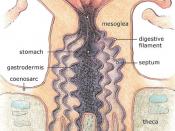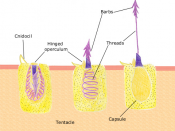Cnidaria Report
Digestive System:
Cnidarians have tentacles, which help them to capture their prey efficiently by making use of paralyzing coiled stingers called nematocysts. These nematocysts are located within the cnidocytes from which their name is derived. The tentacles are then used to draw the cnidarians prey into their mouths. Next, enzymes located within the gastrovacular cavity are used to break up the prey. Certain specialized cells, which line the gastrovacular cavity, then absorb the nutrients.
Excretory System:
Unused material and waste is released through the Cnidarians mouth. Obviously this means that that mouth also serves as an anus. The excreted waste is not feces in the traditional sense; it resembles something closer to urine.
Skeletal/Muscular System:
The physical form of a Cnidarian either resembles a vase or a bell. Coral's always resemble a vase and are scientifically defined as polyps. All Cnidarians have radial symmetry. Cnidarians have two cell layers: the ectoderm and the endoderm.
In between the endoderm and the ectoderm lies a gelatinous substance called mesoglea. A coral's frame is sessile, meaning that they remain stationary for their entire lifespan, attached to a reef. Polyps have a hydrostatic skeleton, which provides them with means to support their frames. This support relies on the incompressibility of fluids within the Polyp's body cavity.
Endocrine System:
The corals endocrine system is not significantly developed.
Reproduction:
Coral reproduction can be either sexual or asexual. When coral engages in sexual reproduction the corals release both eggs and sperm into the water, where the eggs are fertilized. Asexual coral reproduction occurs through budding, which happens when a parent coral divides unequally.
Nervous System:
Corals lack a brain but have a simple nervous system called a nerve net. The nerve net extends from the mouth to the tentacles. Also, Polyps can detect certain substances such as sugars and amino acids. This sense, similar to our senses of smell and taste, enables corals to detect prey.


